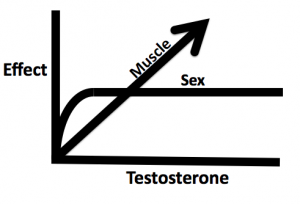Your car is not running well. It just doesn’t have the pick up it used to have. It’s low on gas so you fill it up, but it runs the same. OK, so it’s not the gas… it must be something else, so you begin looking for other causes. Yes, I’m an “old car guy,” but there is a point here.
it must be something else, so you begin looking for other causes. Yes, I’m an “old car guy,” but there is a point here.
Testosterone as Gasoline
Think of testosterone in your body as gasoline in your car.You need it to run and to run well. But a half tank of gas is just as good as a full tank, and topping off the gas tank is not going to help the car run any better. In other words, if you have enough gas—it’s not the problem.
When it comes to building muscle, it is clear that more testosterone is better. The higher the testosterone, the greater the anabolic effect. Weight lifters have known this for years. However, recent studies have shown thatwhen it comes to sexual function, including erections and sex drive, the body may respond differently. More like a car does to gas: at some point adding more doesn’t help it run any better.
The Testosterone Plateau
There is a lot of scientific support for this idea. The most recent is from a European study of 2838 middle age and elderly men (yes, that’s ages 40-79) published last week. It examined the relationship between sexual function and male hormone levels in men who weren’t necessarily seeking care, typically referred to as a “community population.” Here are examples of the many prying questions that these men were asked:
- How often do you think about sex?
- How often do you attempt to have intercourse?
- How frequently do you awake with a full erection?
- Are you worried about your level of sexual desire?
- Are you worried about your ability to have an erection?
- How often do you perform self-stimulation?
What the study found was kind of expected: that testosterone levels correlated with overall sexual functioning in men. But the study also observed that there was a “plateau” effect of testosterone on sexual function. And this plateau occurred at 231 ng/mL (“normal” is 300-800ng/mL). In other words, sexual function worsened when testosterone levels fell below this point, but did not improve when levels increased above it. So, at least in these men, adding more gas to the tank would not necessarily help the car run better.
Notably, in six other clinical studies that have also examined this issue, a similar observation of plateauing testosterone levels was found. Not proof positive, but certainly suggestive of a true biological relationship.
Sexual Function is Not Muscle
So how does this percolate down into clinical practice? Well, I see men every day who have low energy and sex drive and poor erections and who feel “much older” than they feel they should for their age. Accompanying them is a lab report showing that their testosterone level is “low.” Maybe it’s 250 ng/mL, maybe 300 ng/mL. Although I believe that sexual function does not respond to testosterone like muscle does, I also understand that not all men are created equal, unlike assembly-line-built cars. In most cases, I respond “it’s not at all clear where your particular testosterone tipping point is, so lets get you above what you are now and see how you do.”
As with vintage cars, you really have to tinker with men to get them running right. And, it’s important to look beyond the gas issue to solve the problem of the poorly running machine. It’s our duty as good doctors not to just “top off the tank” and needlessly commit men to a life of testosterone replacement.


Comments are closed.